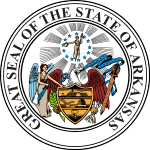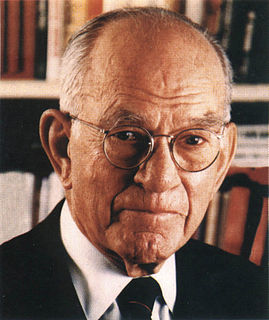
The 1964 United States presidential election was the 45th quadrennial American presidential election. It was held on Tuesday, November 3, 1964. Incumbent Democratic President Lyndon B. Johnson defeated Barry Goldwater, the Republican nominee. With 61.1% of the popular vote, Johnson won the largest share of the popular vote of any candidate since the largely uncontested 1820 election.

Orval Eugene Faubus was an American politician who served as 36th Governor of Arkansas from 1955 to 1967. In 1957, he refused to comply with a unanimous decision of the U.S. Supreme Court in the 1954 case Brown v. Board of Education, and ordered the Arkansas National Guard to prevent black students from attending Little Rock Central High School. This event became known as the Little Rock Crisis.
Joe Edward Purcell was Acting Governor of Arkansas for six days in 1979 as well as Arkansas Attorney General from 1967–1971 and the 13th Lieutenant Governor of Arkansas from 1975–1981.

The Democratic Party of Arkansas is the affiliate of the Democratic Party in the state of Arkansas. It is responsible for promoting the ideologies and core values of the national Democratic Party in Arkansas.
Jerry Kreth Thomasson was a Democratic member of the Arkansas House of Representatives, who in 1966 switched to the Republican Party and ran unsuccessfully for state attorney general in 1966 and again in 1968 on the gubernatorial ticket headed by Winthrop Rockefeller.

Len Everette Blaylock Sr., was a farmer, educator, small businessman, and Republican politician from Nimrod in Perry County in northwestern Arkansas. He was state welfare commissioner under Governor Winthrop Rockefeller, the GOP gubernatorial nominee (1972), the United States marshal for the Eastern District of Arkansas (1975–1978), the appointments secretary for Governor Frank D. White (1981–1983), and the chairman of the Arkansas Republican Party (1985–1986).

The Republican Party of Arkansas (RPA) is the affiliate of the United States Republican Party in Arkansas.
Charles Taylor Bernard, Sr. was an American businessman and politician originally from Earle in Crittenden County in eastern Arkansas. He is best known as the 1968 Republican nominee for the United States Senate seat held by long-time Democrat J. William Fulbright of Fayetteville.

The Arkansas gubernatorial election of November 8, 1966 was the first time since Reconstruction that a member of the Republican Party was elected governor.

Aylmer Lynn Lowe, known as A. Lynn Lowe, was an American farmer and politician from Garland near Texarkana in Miller County in southwestern Arkansas, who was a major figure in the Arkansas Republican Party. He was the Republican gubernatorial nominee in 1978 against the Democrat Bill Clinton, served as state party chairman from 1974 to 1980, and was the GOP candidate in Arkansas's 4th congressional district in 1966, having been defeated by the Democrat David Pryor, then a state representative and a future governor and U.S. Senator, originally from Camden in Ouachita County in south Arkansas.
Virginia Lillian Morris Johnson was the first woman to seek the office of governor of Arkansas. She ran as a Democratic in the 1968 primary election.

Odell Pollard was an attorney in Searcy in White County in central Arkansas, who was a pioneer in the revitalization of the Arkansas Republican Party in the 1960s and 1970s.
The government of Arkansas is divided into three branches: executive, legislative, and judicial. These consist of the state governor's office, a bicameral state legislature known as the Arkansas General Assembly, and a state court system. The Arkansas Constitution delineates the structure and function of the state government. In the early 21st century, Arkansas has four seats in the U.S. House of Representatives and two seats in the U.S. Senate.
Marshall Ney Chrisman, Jr., is a businessman from Ozark in Franklin County in northwestern Arkansas, who served from 1969 to 1970 as a Republican member of the Arkansas House of Representatives. For a single term, he represented Franklin and neighboring Johnson counties. In 1980 and 1982, Chrisman fell far short in primary bids against Frank D. White for the Republican gubernatoirial nomination.
Sterling Robertson Cockrill, Jr., is a retired politician and civic leader and an active artist in Little Rock, Arkansas.
Robert Johnson is an American accountant from his native Jacksonville, Arkansas, who is a Democratic member of the Arkansas House of Representatives for District 42 in a portion of Pulaski County outside the capital city of Little Rock.

The 1964 presidential election in Arkansas was held on November 3, 1964. Voters chose six electors, or representatives to the Electoral College, who voted for president and vice president. Incumbent President Lyndon B. Johnson won the state of Arkansas with 56.06 percent of the popular vote, which was a substantial increase upon John F. Kennedy's 50.19 percent from the preceding election, although the Republican vote remained virtually unchanged at 43.41 percent. Johnson won all but ten of Arkansas' seventy-five counties, and all four congressional districts.















